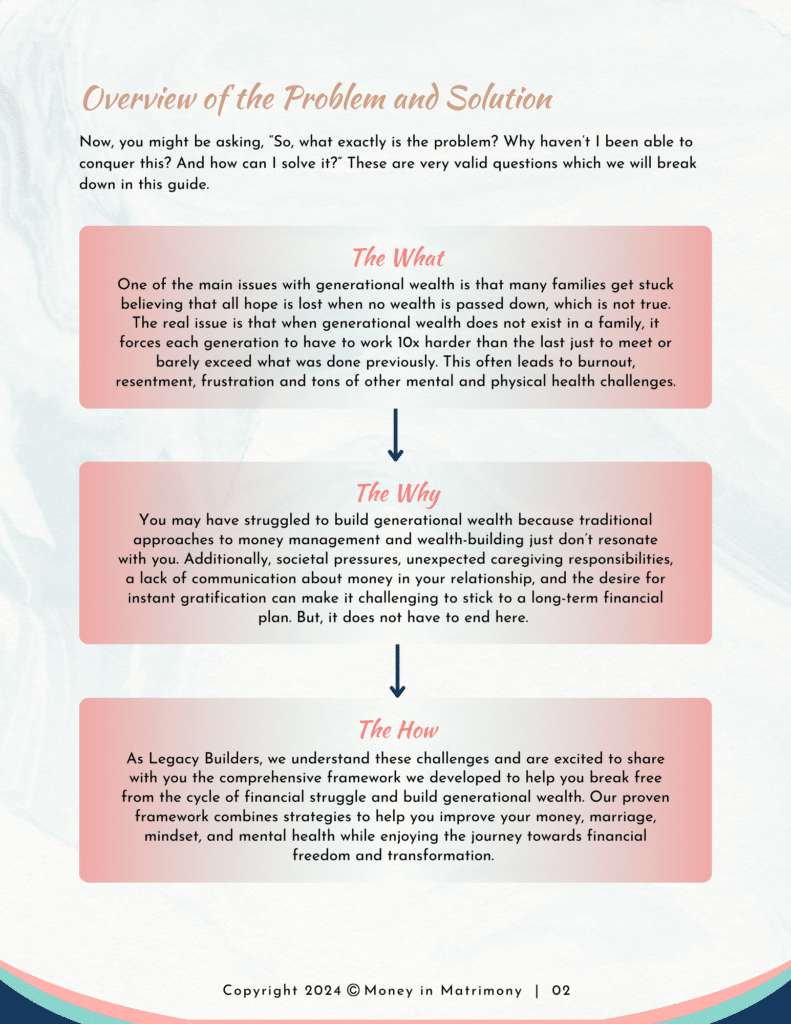Navigating a Tough Economy: Tips for Managing Money During a Recession
This post may contain affiliate links which means that I will receive a small commission for purchases made through those links, at no cost to you.
Guest Post by Kristin Louis

Recessions are a scary time for everyone. Job losses increase, businesses suffer, and the economy slows down. While no one can truly predict when a recession will occur, it’s important to financially prepare in case one does happen. Additionally, keeping a positive attitude and focusing on the long term can help individuals weather the ups and downs of the economy. Here are some steps you and your spouse can take to ensure you’re both financially sound in the face of a recession.
.
Set Up a Budget
The first step you and your spouse should take is to create a budget. This will help you both understand exactly where money is going and allow you to allocate funds according to your expenses. Identify monthly bills, such as rent/mortgage payments, utilities, and groceries. Add those up and compare them to your monthly income. If expenses are higher than your household income, then reducing expenses should be a priority. Set financial goals, prioritize them and keep track of spending. A clear understanding of spending habits can go a long way toward achieving financial goals.
Create a Fund for Emergencies
One of the most important things you and your spouse can do is build an emergency fund. This should ideally be equal to 3-6 months of living expenses. This will provide a safety net during a recession, should you or your spouse lose your jobs or find yourselves struggling in any way with unexpected expenses. Start small and aim to save a certain amount each month. Set up an automatic transfer for a portion of your household income to go directly into your emergency fund. Make sure that your emergency fund is easily accessible, as you or your spouse may need to use it quickly in case of an emergency.
Spend Less and Save Money
Reducing your household spending and cutting costs is key to avoiding financial stress during a recession. Review expenses and identify areas where you both can cut back, for example, dining out less and preparing more meals at home. Look for opportunities to save on expenses such as utility bills by conserving electricity, water, and gas. Evaluate subscription services and cancel unwanted services. Carpooling or taking public transportation can save money on gasoline and parking fees and also benefits the environment. Making small changes can result in significant savings over time.

Invest Smartly
It’s important to invest wisely to ensure that your money can grow over time. Diversify your investments to spread your risk, and consider using the services of a financial advisor. Stocks, mutual funds, and bonds are all popular investment options. While the stock market may experience volatility during a recession, it is important to stay disciplined and avoid making emotional decisions about the stock market. Don’t rely completely on a single investment; diversify your holdings and review investment options regularly to ensure that they align with your investment goals.
Generate Additional Income
During an economic downturn, earning additional income can provide much-needed stability and security in an otherwise uncertain time. Exploring different ways to monetize skills and talents can help bring in extra cash, whether that means offering design services as a freelancer, renting out a spare room, or driving for a ride-hailing service. By diversifying income streams and supplementing a traditional job with other sources of revenue, you and your spouse can build a financial cushion that can help you both weather any economic storm. Whether you’re looking to turn hobbies into a business or leverage your social media presence to earn money, there are countless opportunities to earn extra income and improve your financial outlook in a recession.
Have Business Cards Handy
Creating a business card is a professional and effective way to promote yourself and your skills, even if you are not self-employed. Your card should include important information like your name, phone number, email address, and a brief description of your skills, experience, and education. Hand them out to people you meet, leave them in places where potential clients might pick them up, or include them in letters. Click here for some creative and unique ideas to make your business card stand out, like using a QR code that links to your online portfolio or creating a card that doubles as a small notepad. Don’t underestimate the value of networking and creating connections with others in your field — your business card could be the start of a valuable relationship that pays off in the future.
Collaborate With Financial Advisors
A financial advisor is a critical resource for ensuring you and your spouse’s finances are on track, especially during difficult economic times like a recession. They can help you both make informed investment decisions, create a reasonable and achievable budget, prioritize financial goals, and develop a comprehensive financial plan tailored to your specific needs. With their guidance, you and your spouse can navigate a complex financial landscape and feel confident in your financial future. While there may be costs associated with using a financial advisor, the potential benefits they offer can provide a significant return on investment that becomes invaluable over time.
Study to Get a Career Boost
If you or your spouse are currently stuck in a low-paying job, pursuing further education could be an excellent option. With the availability of online courses, you can now achieve higher education without compromising your current job. Consider universities that offer affordable distance learning and continuing education programs. This could be an available option for a business bachelor’s degree, which could open up new career paths and higher wages. By acquiring relevant skills and staying up-to-date with the latest advancements in your field, you can secure better-paying jobs that will help you sustain yourself, even during a recession.
Recession-proofing your household finances requires a long-term commitment to financial discipline. While the tips mentioned above can help get you started, it’s important to understand that creating a solid financial foundation takes time and effort. By developing good financial habits such as budgeting, increasing income through various streams, and investing in your education and career, you and your spouse can better prepare yourselves for any economic downturns that may arise. Ultimately, taking the time to recession-proof finances provides peace of mind and helps you to become more financially resilient in the future.
About the Author
Kristin Louis is a former advertising copywriter and has two rambunctious boys, 10 and 7 years of age. She created ParentingwithKris.com to share her experiences about the trials and tribulations of parenting.“








